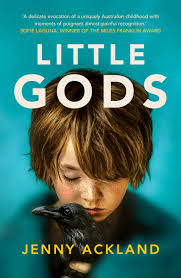Little Gods (Allen & Unwin Books 2018) by Jenny Ackland has been on my TBR pile for a while now but was speedily moved up when it was recently longlisted for the Stella Prize. Reminiscent of Sofie Laguna’s The Choke, Little Gods features the distinct and endearing voice of Olive Lovelock, 12 years old, who is growing up in the flat scrubland country of north-western Victoria. She is an only child but spends much of her time with her aunt and uncle and her three cousins, and with her half-tame, half-wild bird, Grace. Olive’s father Bruce is silent; her mother Audra is delicate. Her aunt Rue and her uncle William are warm and welcoming. Her cousins Sebastian, Archie and little Mandy, and her best friend Peter, are her compatriots on adventures large and small. Her aunt Thistle is mysterious and knowing; she treats Olive as a grown-up, tells her things the other adults keep secret, and involves all the children in literary pantomimes and productions that seem to take a lot out of her. The book immerses us in that liminal time of tweenhood, between childhood and adolescence, when much of life is still playing games and having fun, but adult issues are beginning to become important, and the line between what is suspected or what is guessed at, and what is known for sure, becomes blurred. It is a time of baking on the hot concrete of the local pool, bike-riding for hours until the sun goes down, exploring caves and creeks, rescuing wildlife and collecting treasures. It is a time when the innocence of childhood begins to dissipate, and the responsibilities of growing older begin to intrude.
Olive is feisty, intelligent, quick-witted, compassionate and brave. She has a wonderful imagination and is always up for adventure. When – by chance – she learns that she had a baby sister who died, she becomes convinced it was no accident, but murder. Her suspicions fall heavily on the Sands family, with their motley crew of five boys who always seem to be on the wrong side of the law and/or the rules of society or outside the bounds of polite behaviour. She becomes obsessed with uncovering the truth of this mystery and stops at nothing in her investigations. But as Olive discovers more and more about what went on in her family so many years earlier, she realises that knowing the truth is not always better than blissful ignorance.
The strength of this book is firstly in its depiction of a rural Australian childhood, which will transport readers to their own early experiences of nature, family, friendship, school, discipline, loyalties and curiosity. Secondly, it is the distinct and authentic voice of Olive, who is a compelling character that we love despite (or perhaps because of) her flaws. And thirdly, it is an exploration of the complex ties of memory, truth and imagination; about the lies we tell others and the lies we tell ourselves. This novel perfectly depicts the natural curiosity, wonder and inventiveness of childhood, the deep and lasting effects of grief, and the poignancy of the myth of stability offered by family.

